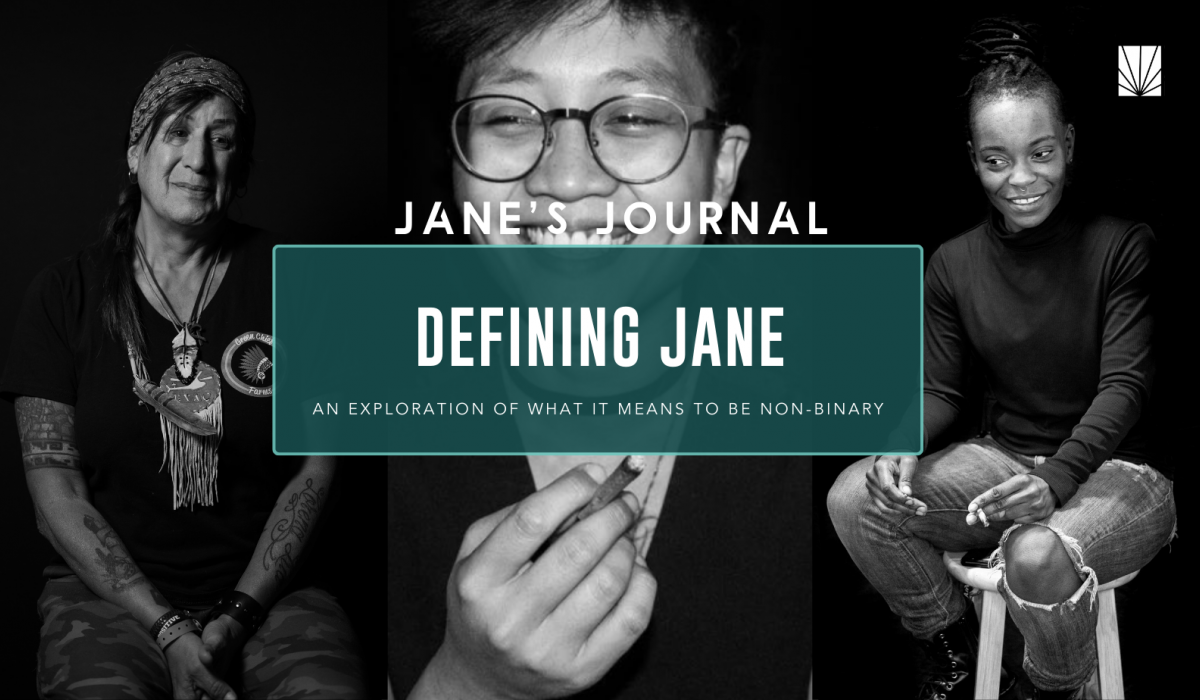
Defining Jane: An Exploration of What it Means to Be Non-Binary
This is Jane Project (TIJP) began in 2019 as a simple, yet profound idea to tell stories of women and non-binary (NB) trauma survivors who use cannabis as medicine. Aimed at destigmatizing conversations around trauma, healing, and medicating with cannabis, this thoughtfully curated campaign published beautiful black-and-white portraits of trauma survivors, or as we like to call ourselves, Janes.
From that 2019 campaign, themes began to emerge. After documenting more than 50 Janes across 3 cities, TIJP saw a common thread: Access barriers. Access to medicine. Access to community. Access to spaces that use gender-inclusive and affirming language.
Janes coast-to-coast were suffering and TIJP felt called to do something about it. So, in 2020 TIJP became a federally recognized 501(c)(3) providing access to education, community, and in select cities, regulated cannabis for women and non-binary people.
We will always be grateful for those founding Janes. Their experience, strength, and hope for healing spoke loudly and we listened! Because of your courage, hundreds of Janes now have access to trauma-informed programming, community, and medicine.
Who is Jane?
At TIJP we define Jane /jān/ as any self-identified woman or non-binary person who chooses plant medicine to confront, manage, and heal trauma.
To that, some may ask, “What is trauma”, and/or, “Who is a trauma survivor?”
TIJP recognizes trauma as a deeply distressing or disturbing experience. We also align with Dr. Gabor Mate’s definition that explains trauma as: “not what happens to you; but what happens inside you as a result of what happens to you.”
If you have survived (or are surviving) a deeply distressing experience, you are a trauma survivor. If you also identify as a woman or non-binary, you are a Jane.
Understanding the Non-Binary Identity

Non-binary describes a gender and identity that exists outside the traditional binary understanding of man and woman. Non-binary individuals may identify as having a gender that is a blend of both masculine and feminine, neither, or something entirely different. Someone who is non-binary might feel like a mix of genders or like they have no gender at all.
How to Know if Someone is Non-Binary?
One can never assume. One tool is to use your own pronouns when introducing yourself to someone new. This usually prompts them to answer in the same way. Asking what someone’s pronouns are is another way. This is why gender-affirming and inclusive language used in work, family, and community settings is so important. It helps to create a new normal; one where non-binary people feel seen, safe, and secure in their place in society.
The Nuances of the Gender Spectrum
Gender identity is deeply personal and intrinsic to one’s identity. While traditional views often limit gender, the reality of human identity is far more complex and diverse. There are numerous gender identities. 68 and counting to be exact! They include but are not limited to male, female, transgender, gender neutral, non-binary, agender, pangender, genderqueer, two-spirit, third gender, and all, none or a combination of these. It’s a lot to take in, we know! That’s why we are writing this blog. As a resource and a reminder for the community.
The Power of Proper Pronouns
Pronouns are important because they are the smallest and easiest way one can acknowledge someone’s agency in choosing their own identity. They also help shift a common social misunderstanding: that there are only boys or girls, and men or women.
One way we approach this common misunderstanding is to refer folks to the dictionary. The term “them” has been used as a way to describe a single person for centuries. In fact, “they” has been in consistent use as a singular pronoun since the late 1300s.
Pro Tip: Gender identity is deeply personal and can fluctuate over time. No one feels their gender in the same way, every day. It’s important to hold space for people when/if their pronouns change and to do your best to use their current pronouns properly.
Gender-Affirming Language
Using proper pronouns and gender-affirming language is important not just for the person, but for society as a whole. In addition to fostering inclusivity, when we address someone with the correct pronouns, or use the term “you all” instead of “you guys”, we are using our voices as a tool for education and awareness.
At This is Jane Project, using proper pronouns and gender-inclusive language is critical. Having an array of pronoun options on registrations, identifying Janes by their preferred name, and having non-binary facilitators for community and education events are just some of the ways TIJP works to maintain a safe space for non-binary Janes.
Trauma Talk
There is an immense stigma around discussing trauma. TIJP believes conversations with cannabis can “be both a bridge and a vessel in challenging this silence”. Trauma can stem from situations such as bullying, living in high-crime areas, financial stress, and/or encounters with microaggressions. It can also be sexual assault, the loss of a loved one, medical trauma or health crises, or existing in this world as a person of color.
Trauma in Women
Estimates by the World Health Organization suggest 1 in 3 women will experience physical or sexual violence in her lifetime, often at the hands of an intimate partner. The Centers for Disease Control and Prevention estimates approximately 1 in 4 women will experience a rape or attempted rape. In times of conflict, crimes against women are often used as a tool of war. Then there is reproductive trauma, exploitation, and domestic violence, to name a few. While gender-based violence can affect all genders, it predominantly affects women and girls and can be most acute in places and communities where women have less social and economic power.
Trauma in Non-Binary Individuals
Non-binary individuals, similar to women, can experience their own unique set of traumas. Some of these traumas could be identity invalidation and rejection, body and/or gender dysmorphia, societal pressure and erasure, and/or additional legal challenges. They also have an increased risk of exposure to harassment and violence according to a 2020 study.
Jane – A Closer Look
TIJP’s 2023 anonymous demographic survey identified a number of revelations about the Jane community.
- Janes surveyed range from 21 to 79 years old
- 97.3% of Janes surveyed have experienced trauma
- 11.5% of Janes surveyed identify as non-binary or genderfluid
- 51.1% of Janes surveyed identify as 2S/LGBTQIA
Becoming Jane
Over the last 5 years it has become clear that access to trauma-informed programming, community, and resources is essential and immensely valuable to the Janes who find their way to TIJP.
“Really it’s the community aspect that’s always drawn me to This is Jane Project.” Jane, 37
“Events like this that make medicine affordable and attainable are so important for the breast cancer community.” Jane, 46
“I enjoyed the connection with others and how safe the space felt.” Jane, 25
Due in large part to our sponsors and generous team of volunteers, TIJP is on track to serve hundreds of women and non-binary survivors – two communities that experience way more than their fair share of trauma. Yet, things are beginning to trend upward.
Today, there are more women than ever holding executive positions, sitting in directors’ chairs and being voted into public office. In addition, those who identify outside of the binary are seeing social and political change happening in real time. The they/them identity has seen a seismic resurgence. We celebrate International Non-Binary Peoples Day every July 14th. Non-binary people like Janelle Monáe and Sam Smith grace magazine covers. Elected officials who identify as NB even increased by 91.7 percent in 2022!
Visibility for NB people is at an all time high, yet too many still lack the support and community they need. To those people, This is Jane Project might be for you. Here, you will find a trauma-informed community of women and non-binary people healing together. You will also find a community who celebrates cannabis and recognizes its therapeutic potential. Most importantly, you will find a place where you can come exactly as you are. In all ways, always.
Women and non-binary Janes from across the country gather at TIJP’s virtual Healing Happy Hours and virtual HEARTs Healing Arts events. Hundreds more gather in-person for the Survivors Without Access compassion events in Los Angeles, Denver, Chicago, and Bordentown, NJ.
Cover Image Photography Credits (From left to right): Xochitl by Mahogany Visions, Traz by @bc.n.photos, Ash by @thiscannabislife
